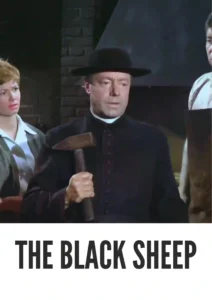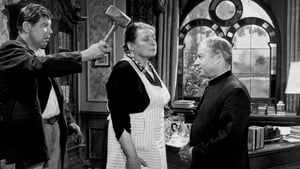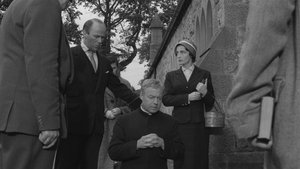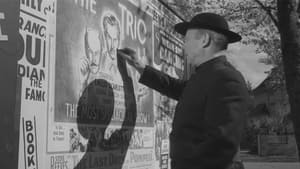Contact: info@alwanfilm.com
Video Sources 0 Views
Synopsis
Review: Das schwarze Schaf 1960 Colorized – A Masterclass in Comedy and Mystery

Introduction
“Das schwarze Schaf,” or “The Black Sheep,” is a 1960 German crime comedy that holds a special place in the annals of European cinema. Directed by Helmuth Ashley, this film blends elements of mystery and humor, creating a unique cinematic experience that has captivated audiences for decades. The movie features an ensemble cast led by the inimitable Heinz Rühmann, whose portrayal of the wily and lovable Father Brown has become iconic. In this article, we will delve into the significance of “Das schwarze Schaf 1960,” exploring its plot, characters, themes, and its enduring legacy in the world of cinema.
Check The Full Colorized Movies List
Check Our Colorized Movies Trailer Channel
Understanding Das schwarze Schaf 1960 Colorized: Director, Cast, and Genre
“Das schwarze Schaf 1960” is a prime example of German cinema’s ability to blend genres seamlessly. Directed by Helmuth Ashley, a filmmaker known for his work in both television and film, this movie captures the essence of a crime thriller while injecting it with a healthy dose of humor. Ashley’s direction is both assured and inventive, allowing the film to maintain a light-hearted tone while still delivering suspenseful moments.
At the heart of the film is Heinz Rühmann, one of Germany’s most beloved actors. Rühmann’s portrayal of Father Brown, a clever and unassuming priest with a knack for solving crimes, is nothing short of brilliant. His performance strikes the perfect balance between comedy and drama, endearing him to audiences and solidifying his status as a cinematic legend. The supporting cast, including Siegfried Lowitz as Inspector Valentine and Lina Carstens as the housekeeper Mrs. Smith, adds depth and charm to the film, making it a delightful ensemble piece.
The genre of “Das schwarze Schaf 1960” is best described as a crime comedy, but it also carries elements of the mystery genre. The film’s ability to navigate between these genres without losing its narrative focus is a testament to the skill of both the director and the cast. This genre-blending is one of the reasons why “Das schwarze Schaf 1960” remains a beloved classic in German cinema.
Exploring the World of Das schwarze Schaf 1960 Colorized: Plot and Characters
The plot of “Das schwarze Schaf 1960” centers around Father Brown, a seemingly ordinary priest with an extraordinary talent for solving crimes. The film begins with Father Brown being transferred to a new parish, where he quickly becomes involved in a local mystery. When a valuable painting is stolen from the church, Father Brown takes it upon himself to investigate, much to the chagrin of the local police.
As Father Brown delves deeper into the case, he uncovers a web of intrigue involving a colorful cast of characters, including a shady art dealer, a suspicious butler, and a group of eccentric townsfolk. With his sharp wit and keen observational skills, Father Brown gradually pieces together the puzzle, revealing the true culprit in a classic whodunit style.
What sets “Das schwarze Schaf 1960” apart from other crime films is its focus on character-driven storytelling. Each character in the film is richly developed, with their quirks and personalities contributing to the overall narrative. Heinz Rühmann’s Father Brown is the epitome of this approach, as his interactions with the other characters drive the plot forward while also providing moments of humor and heart.
The film’s supporting characters, such as Inspector Valentine, played by Siegfried Lowitz, add to the film’s charm. Valentine’s exasperation with Father Brown’s unorthodox methods provides a comedic counterpoint to the more serious aspects of the investigation. Similarly, Lina Carstens’ Mrs. Smith, the loyal but somewhat scatterbrained housekeeper, adds a touch of warmth and levity to the film.
The Art of Crime Comedy
Crime comedies like “Das schwarze Schaf 1960” occupy a unique niche in cinema, combining the tension and intrigue of a mystery with the light-heartedness of a comedy. The art of crafting a successful crime comedy lies in maintaining a delicate balance between these two elements, ensuring that the humor does not undermine the suspense, and vice versa.
In “Das schwarze Schaf 1960,” this balance is achieved through a careful blend of witty dialogue, character-driven humor, and a well-constructed mystery plot. The film’s comedic moments arise naturally from the interactions between the characters, rather than relying on slapstick or forced humor. This approach allows the film to maintain a sense of realism, even as it delivers laugh-out-loud moments.
The Golden Era of German Cinema
The 1960s were a golden era for German cinema, with filmmakers experimenting with new genres and styles. “Das schwarze Schaf 1960” is a product of this era, reflecting the creative energy and innovation that characterized German film during this time. Directors like Helmuth Ashley were at the forefront of this movement, blending traditional storytelling techniques with modern sensibilities to create films that were both entertaining and thought-provoking.
This period also saw the rise of actors like Heinz Rühmann, who became synonymous with the German film industry. Rühmann’s ability to convey both humor and pathos made him a favorite among audiences, and his performance in “Das schwarze Schaf 1960” is a testament to his versatility as an actor. The film’s success can be attributed in large part to Rühmann’s star power, as well as the strong supporting cast and tight direction.
Das schwarze Schaf 1960 Colorized and Its Place in German Cinema
“Das schwarze Schaf 1960” occupies a special place in the pantheon of German cinema. Its success can be attributed to its unique blend of genres, its memorable characters, and its witty dialogue. The film’s ability to entertain while also engaging the audience with a compelling mystery is a testament to the skill of everyone involved in its production.
The film’s popularity has endured over the years, with new generations of viewers discovering its charms. Its influence can be seen in later German films, particularly those that blend comedy with other genres. “Das schwarze Schaf 1960” set a precedent for the crime comedy genre in Germany, and its impact is still felt today.
The Debate Over Genre-Blending in Cinema
The blending of genres in films like “Das schwarze Schaf 1960” often sparks debate among critics and audiences. Some argue that genre-blending can dilute the impact of a film, making it difficult to categorize and diminishing its overall effectiveness. Others, however, see genre-blending as a way to push the boundaries of traditional storytelling, creating films that are innovative and engaging.
In the case of “Das schwarze Schaf 1960,” the blending of crime and comedy is handled with such skill that it enhances, rather than detracts from, the film’s impact. The film’s ability to navigate between humor and suspense is one of its greatest strengths, making it a standout example of successful genre-blending in cinema.
Examining Das schwarze Schaf 1960 Colorized as a Crime Comedy
“Das schwarze Schaf 1960” exemplifies the crime comedy genre, using humor to enhance the mystery rather than detract from it. The film’s success lies in its ability to maintain the tension of the crime plot while also delivering moments of genuine comedy. This balance is achieved through sharp writing, strong performances, and a keen understanding of the genre’s conventions.
Heinz Rühmann’s portrayal of Father Brown is central to the film’s success as a crime comedy. His character’s calm demeanor and sharp wit provide a steady anchor for the film, allowing the comedy to emerge naturally from the situations he encounters. The film’s humor is often subtle, relying on clever dialogue and character interactions rather than overt jokes or slapstick.
The mystery at the heart of “Das schwarze Schaf 1960” is also well-crafted, with enough twists and turns to keep the audience engaged. The film’s pacing is deliberate, allowing the plot to unfold gradually while maintaining a sense of suspense. The resolution of the mystery is both satisfying and in keeping with the film’s tone, providing a fitting conclusion to the story.
Influence and Legacy: Das schwarze Schaf 1960 Colorized’s Impact on Cinema
“Das schwarze Schaf 1960” has had a lasting impact on both German and international cinema. Its success helped to solidify the crime comedy genre in Germany, influencing later films and television shows that sought to blend humor with mystery. The film’s influence can also be seen in the portrayal of detective characters in German media, with Father Brown serving as a template for later amateur sleuths.
The film’s legacy is also evident in the continued popularity of the Father Brown character, who has appeared in numerous adaptations and interpretations over the years. “Das schwarze Schaf 1960” remains one of the most beloved portrayals of Father Brown, thanks in large part to Heinz Rühmann’s performance.
Director’s Cinematic Legacy: Beyond Das schwarze Schaf 1960 Colorized
Helmuth Ashley, the director of “Das schwarze Schaf 1960,” enjoyed a successful career in both film and television. While he is perhaps best known for this film, his work spans a variety of genres and styles. Ashley’s ability to navigate between different types of storytelling, from crime dramas to comedies, is a testament to his versatility as a director.
Ashley continued to work in television throughout the 1960s and 1970s, directing episodes of popular German series and contributing to the development of the country’s television landscape. His work in film, however, remains a significant part of his legacy, with “Das schwarze Schaf 1960” standing out as a highlight of his career.
Themes Explored in Das schwarze Schaf 1960 Colorized
“Das schwarze Schaf 1960” explores themes of morality, justice, and the role of the outsider in society. Father Brown, as the titular “black sheep,” is an outsider in his new parish, yet it is his outsider status that allows him to see the truth and solve the mystery. The film also touches on themes of trust, deception, and the power of observation.
The character of Father Brown embodies the idea that appearances can be deceiving. Despite his unassuming appearance and gentle demeanor, he possesses a sharp intellect and a deep understanding of human nature. This theme of looking beyond appearances is central to the film’s narrative and is reflected in the way the mystery unfolds.
Reception and Controversy Surrounding Das schwarze Schaf 1960 Colorized
Upon its release, “Das schwarze Schaf 1960” was met with widespread acclaim from both critics and audiences. The film’s blend of comedy and mystery was praised for its originality and wit, and Heinz Rühmann’s performance as Father Brown was particularly lauded. The film’s success at the box office further cemented its status as a classic of German cinema.
However, some critics raised concerns about the film’s light-hearted treatment of crime, arguing that it could trivialize serious issues. Others questioned the film’s portrayal of the police, suggesting that the comedic elements might undermine the authority of law enforcement. Despite these critiques, “Das schwarze Schaf 1960” has remained a beloved film, appreciated for its humor, charm, and clever storytelling.
Where to Watch Das schwarze Schaf 1960 Colorized Online
For those interested in experiencing “Das schwarze Schaf 1960,” the film is available on various streaming platforms, making it accessible to audiences around the world. Whether you are a fan of classic cinema or new to German films, “Das schwarze Schaf 1960” is a must-watch for its unique blend of comedy and mystery.
FAQs About Das schwarze Schaf 1960 Colorized
Q: Is “Das schwarze Schaf 1960” based on a true story?
A: No, “Das schwarze Schaf 1960” is a work of fiction. The film is loosely based on the Father Brown stories by G.K. Chesterton, but it is not based on any real events.
Q: What is the significance of the title “Das schwarze Schaf”?
A: The title, which translates to “The Black Sheep,” refers to Father Brown’s status as an outsider in his new parish. It also reflects the film’s theme of appearances being deceiving, as Father Brown’s unassuming nature allows him to solve the mystery.
Q: How does “Das schwarze Schaf 1960” compare to other Father Brown adaptations?
A: “Das schwarze Schaf 1960” is considered one of the most beloved adaptations of the Father Brown character, thanks in large part to Heinz Rühmann’s performance. While other adaptations have taken different approaches, this film is notable for its blend of comedy and mystery.
Conclusion
In conclusion, “Das schwarze Schaf 1960” is a timeless classic that showcases the best of German cinema. With its unique blend of crime, comedy, and mystery, the film continues to captivate audiences with its wit, charm, and clever storytelling. Heinz Rühmann’s portrayal of Father Brown is a highlight of the film, embodying the character’s intelligence, humor, and moral integrity.
“Das schwarze Schaf 1960” is more than just a film; it is a masterclass in genre-blending and character-driven storytelling. Its influence on German cinema is undeniable, and its legacy continues to be felt in the crime comedies and detective stories that followed. For those seeking a film that entertains while also engaging the mind, “Das schwarze Schaf 1960” is an essential watch.













